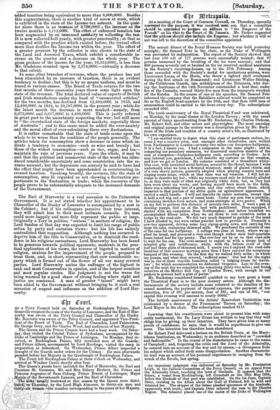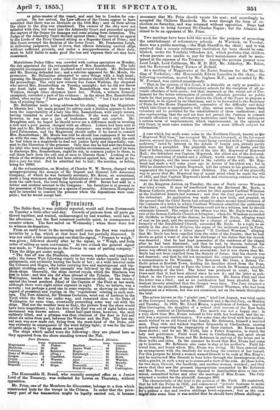(Of ft nits.
At a meetingof the Court of Common Council, on Thursday, specially convened for ft purpose,- it was resolved nem. con. that a committee should be appointed to prepare an address to " the Emperor of the French" on his visit to the Court of St. James's. Mr. Parker suggested that the address should also include the Empress; but whether it will or not was left to the discretion of the committee appointed.
The annual dinner of the Royal Humane Society, was held yesterday sennight; Sir Samuel Peto in the chair, as the Duke of Wellington was prevented by indisposition. The report of the Society showed that last year 150 out of 177 persons were successfully treated; that 97 persona immersed by the breaking of the ice were rescued ; and that 690 persons severely cut or bruised on the ice received .medical assistance in the Society's receiving-houses, up to the 27th February. Among those rewarded with the Society's medal for meritorious actions, were Lieutenant Lucas, of the Heels, who threw a lighted shell overboard during the first attack on Bomarsund ; and Lieutenant Walter Stirling, of the Coldstream Guards, late midshipman of the Britannia, who dur- ing the hurricane of the 14th November commanded a boat that, under fire of the Cossacks, rescued thirty-five men from the transports wrecked off the Katcha. In the course of one of his speeches, Sir Samuel Pete informed the company that the Balaklava railroad would be completed as far as the English head-quarters by the 26th, and that then 1000 tons of ammunition could be carried to the front every day. The subscriptions exceeded 600/.
The tenth anniversary of the Royal Theatrical Fund was celebrated, on Monday, by the usual dinner at the London Tavern ; with the usual amount of funny speechmaking from Mr. Buckstone' Mr. Charles Dickens, Mr. Robert Bell, and other actors and playwrights. The most amusing and original passage in the oratory was a description given by Mr. Buck- stone of the trials and troubles of a country actor's life, as illustrated by his own experience. "I am enabled truly to depict what this class of performers endure, be- cause I was a country actor, and, amongst other vicissitudes, once walked from Northampton to London—seventy-two miles—on fourpence-halfpenny. It is a fact, I assure you. I had a companion in the same plight ; and on comparing our pecuniary resources, we discovered ourselves masters of the sum of ninepence—fourpence-halfpenny each, according to Cocker. As it may interest you, gentlemen, I will describe my costume on that occasion, and how we got to London. My costume consisted of a threadbare whity- blue coat, with tarnished metal buttons, secured to the throat, because I wore underneath what we term a flowered waistcoat, made of glazed chintz, and of a very showy pattern, generally adopted when playing country boys and singing comic songs, which at that time was my vocation. I will not at- tempt to describe my hat ; while my trousers must only be delicately, alluded to, as they were made of what was originally white duck, but,. as they had been worn about six weeks, and having myself been much in the fields, there was a refreshing tint of a green and clay colour about them, which imparted to that portion of my attire quite an agricultural appearance. I carried a small bundle. I will not describe its entire contents, except that it held a red wig and a pair of russet boots. Under my arm was a portfolio, containing sketches from nature, and some attempts at love poetry. While on my feet to perform this distance of seventy-two miles, I wore a pair of dancing pumps, tied up at the heel with packthread. Thus equipped, I started with my companion from Northampton'; and before breakfast we accomplished fifteen miles, when we sat down to rest ourselves under a hedge by the road-side. We felt very much disposed to partake of the meal I have alluded to, but were rather puzzled how to provide it. Presently a cow-boy appeared, driving some lazy zigzag-going cows, and carrying two large tin cans, containing skimmed milk. We purchased the contents of one of the cans for one halfpenny. A cottage was close at hand, where we ap- plied for bread, and procured a very nice though rather stale half-quarters home-baked loaf for one penny. The cow-boy sat by us on that road-side to wait for his can. The cows seemed to regard us with a sleepy look of mingled pity and indifference, while, with the bottom crust of that loaf and three pints of skimmed milk, I assure you I enjoyed the road-side. breakfast of that summer morning more than I have enjoyed the sumptuous banquet of this evening. On the first day we walked forty miles ; in which my pumps, and what they covered, 'suffered some.' Our bed for the night was in one of those wayside hostelries called a lodging-house for travel- lers' ; for which accommodation we disbursed twopence. Late in the even- ing of the next day we completed the remaining thirty-two miles; and foun4; ourselves at the Mother Red Cap, at Camden Town, with enough in out' pockets to procure half-a-pint of porter." Mr. Buckstone considered himself qualified to say how great a boon: the Theatrical Fund is to the poor country actors. Although the dia., bursements of the society include sums returned, to the families of de- ceased members, the payment of funeral expenses, the payment of ten annuities five of 30/. per annum, four of 60/., and one of 901., "our capital this evening will amount to nearly 90001."
The fortieth anniversary of the Artists' Benevolent Institution was celebrated by a dinner at the Freemasons' Tavern on Saturday ; the Lord Mayor in the chair. The subscriptions reached 6111.
Learning that his constituents were about to present him with some costly testimonial, Sir De Lacy Evans has written to beg that they will i oblige him by giving up their intention. They have given him so many: proofs of confidence, he says, that it would be superfluous to give one more. The intention has therefore been abandoned.
Sir Robert Peel delivered a lecture on the British Poets, at the Mary- lebone Institution, on Wednesday, to an audience described as " crowded- and fashionable." In the course of his dissertations he came to the name of Campbell ; and, forgetting the critic and the Lord of the Admiralty, he entered into an account of the war and its causes,—a divergence from his subject which called forth some disapprobation. Another characteris- tic trait was an account of his personal experiences in escaping from the wreck of the Ercole, last spring.
An important judgment was delivered on Saturday by Mr. Pemberton Leigh, in the Judicial Committee of the Privy Council, on an appeal from the Admiralty Court, touching :the laws of blockade, It appears that the Ostsee, a vessel from Mecklenburg, left Cronstadt on the 16th May 1854, before the blockade of that port was established. On the 1st June, Captain Otter, cruising in the Alban about the Gulf of Finland, fell in with and detained her. The skipper of the Ostsee pleaded ignorance of the blockade, apparently with truth ; and Captain Otter referred the case to Sir Charles Napier. The Admiral placed one of the mates of the Duke of Wellington
as prize-master of the vessel, and sent her to London for con-
nastier]. On her arrival, the Law-officers of the Crown appear to have admitted that there was no blockade on the 16th May ; and on their advice the claim to the ship was abandoned. The owners of the ship were not satisfied with this, but went into the Admiralty Court and proceeded against the captors of the Ostsee for damages and costa arising from detention. The Judge of the Admiralty Court decided against them; they carried an appeal to the Lords of the Privy Council sitting as a Supreme Court of Prize ; and this Court reversed the decision of the lower Court. Mr. Pemberton Leigh, in delivering judgment, laid it down, that officers detaining neutral ships without sufficient grounds, and under a misapprehension of their duty, must be held liable to make good the loss and expense their act may have occasioned.
Marylebone Police Office was crowded with curious spectators on Monday, the day appointed for the reexamination of Mrs. Ramsbotham. The lady appeared accompanied by her husband and several friends. Mr. Ballantine and Mr. Herring defended her ; and a solicitor appeared for Mr. Moule, the prosecutor. Mr. Ballantine attempted to carry things with a high hand ; opposing the Magistrate's order that the prisoner should lift her veil during the proceedings. The only new witness was James Watkins, the ahopman who served Mrs. Ramsbotham on Tuesday sennight ; but he did not throw any fresh light upon the facts. Mrs. Ramsbotham was not known to Watkins, though other shopmen knew her. Welsh, a witness formerly examined, corrected a part of his evidence : in the street Mrs. Ramsbotham added, after saying " I have got the handkerchiefs," " but I had no inten- tion of stealing them." Mr. Ballantine made a long- address for his client, urging the Magistrate to liberate her : his main ground for asking such a decision appears to have been the improbability of a lady like Mrs. Ramsbotham, with ample means, having intended to steal the handkerchiefs. If she were sent for trial, however, he was sure ajury of tradesmen would not convict. Mr. Broughton said, he hoped he should never see a difference made in treating a rich and a poor person charged with an offence. Letters had been sent to him and to Mr. Moule of a threatening character : one writer said he knew Lord Palmerston, and the Magistrate should suffer if he dared to commit Mrs. Ramsbotham ; Mr. Moule was told he should lose customers if he went on with the case. Mr. Broughton said he could not, consistently with the oath he had taken as a magistrate to deal out justice fairly and impartially, con- sent to the liberation of the prisoner. Only that day he had sent two females for trial who were charged under nearly similar circumstances; and if he were to discharge Mrs. Ramsbotham, ought he not, in common justice to them, to call them back from the cell and at once to liberate them ? Looking at the whole of the evidence which had been adduced against her, she must go be- fore a jury for trial. But he admitted her to bail ; the sureties, as before, being for 20001.
At the reexamination, on Monday, of Charles W. W. Bevan, charged with misappropriating the moneys of the Deposit and General Life Assurance Company, of which he was formerly secretary, Mr. Knox, an accountant, made a long statement showing the defalcations of the accused as apparent from the cash-book, the total being upwards of 5001. Bevan had sent in a debtor and creditor account to the Company : his furniture is at present in the possession of the Company as a species of security. Alderman Humphery said he intended to commit the prisoner when the depositions were com- plete ; but he would accept bail.



























 Previous page
Previous page